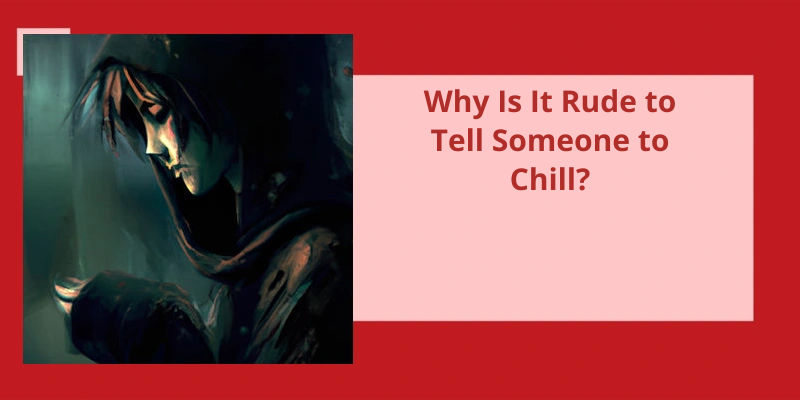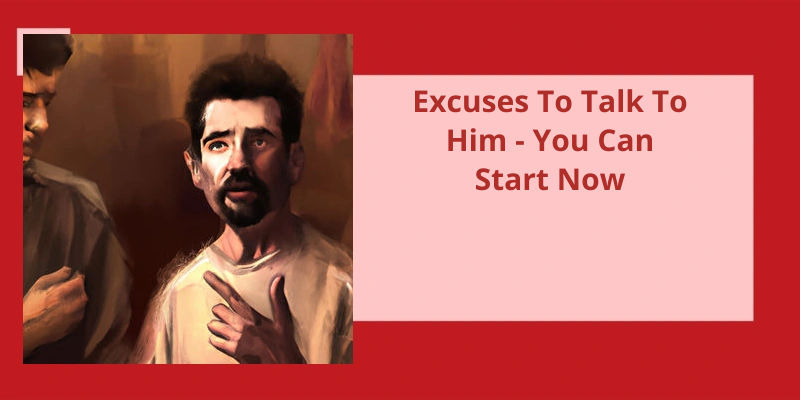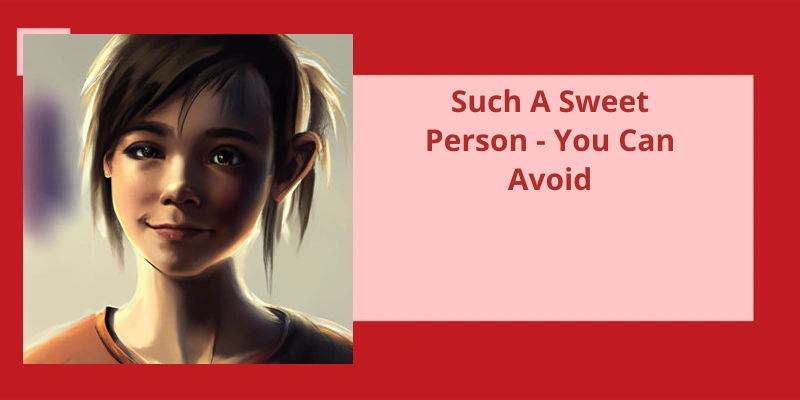As humans, we often forget the profound power of our words and actions. What we say and do can have a significant impact on those around us. Long gone are the days where the saying "sticks and stones may break my bones, but words will never hurt me" was considered an effective mantra. In today's society, we acknowledge the immense damage that verbal abuse, micro-aggressions, and derogatory comments can cause. One such phrase that often gets casually tossed around is the directive to "chill" or "calm down." While it may seem like harmless advice, in reality, it can come across as insensitive, dismissive, and derogatory. Therefore, it's essential to understand why telling someone to chill is considered rude and the potential harm that can result from using such language.
Should You Say Chill to a Girl?
Furthermore, if youre not close friends with the girl or don’t know her well enough, it’s best to avoid using the term altogether. Chill may come off as dismissive or condescending and could give a negative impression of you.
In general, it’s best to listen to what the girl is saying and respond accordingly. If shes expressing a concern or feeling upset, acknowledge her emotions and try to understand her perspective. This won’t only help to deescalate the situation but also show her that you value and care about her feelings.
Ultimately, it’s important to remember that language has power and can have significant cultural and social connotations. Using phrases like “chill” can have different meanings in different contexts, and it’s important to be aware of how it may be perceived by others. In situations where youre unsure, it’s always best to err on the side of caution and choose your words carefully.
While it can be acceptable in certain situations, it’s important to consider the possible implications and meanings of using this term. Listening to the girls concerns and responding empathetically is always the best approach to building and maintaining positive relationships, regardless of the words you use.
When a girl says that she wants to chill, it can mean different things to different people. While some may interpret it positively as a girl being easygoing, others may perceive it as a lack of enthusiasm or drive. In this article, we will delve deeper into the various connotations of the term and what girls actually mean when they use it.
What Does It Mean if a Girl Wants to Chill?
So, if a girl wants to chill, it could mean that shes looking for a low-key hangout without any pressure or expectations. It could mean that shes not looking for anything serious right now, or that she wants to take things slow and get to know you better before diving into a more committed relationship.
Maybe shes been working long hours, or dealing with personal issues, and she just needs someone to vent to and relax with. In this case, it’s important to be supportive and understanding, and to let her know that youre there for her no matter what.
Regardless of the reason behind her desire to chill, it’s important to communicate openly and honestly with her about your own expectations and intentions. If youre looking for something more serious and committed, make sure she knows that, and don’t be afraid to ask her what shes looking for as well. Ultimately, the key to any successful relationship is mutual respect and understanding, so take the time to get to know her and figure out what she really wants and needs from you.
In today’s social circles, we use a variety of terms to describe people’s personality traits. While some words have negative connotations, others are seen as positive attributes. One term that’s increasingly used to describe someone is ‘chill’. But is being called ‘chill’ a compliment or an insult? Let’s explore the nuances of this term further.
Is Chill a Compliment?
When it comes to the word “chill”, there’s no denying that it’s become a part of modern-day lingo. Is it a compliment or an insult? Well, it all depends on the context.
To begin with, when we say someone is chill, we’re talking about a person who’s easygoing and laidback. This means they don’t stress over the small things in life and have a very relaxed and calm demeanor. People who’re chill are known for being able to handle all kinds of situations without getting worked up and causing drama. They’re the ones who can keep a cool head and solve problems effortlessly.
Chill people have a sense of self-assurance that allows them to be comfortable in their own skin and not feel the need to constantly prove themselves. This confidence can be contagious, making others around them feel at ease as well.
It means that you’re a person with a balanced personality, who’s easygoing, friendly, and confident in themselves. Therefore, if someone calls you chill, take it as a compliment and be proud of the positivity you bring to the world.
The Possible Negative Connotations of Being “Too Chill” and How It Can Affect Personal and Professional Relationships
This topic explores the potential negative associations with being overly relaxed and it’s impact on personal and professional connections.
Source: Being chill isn’t exactly a compliment.
It’s not uncommon to feel defensive or upset when someone tells you to “chill,” but reacting in anger or frustration won’t solve anything. Instead, take a deep breath and focus on remaining composed. By keeping your emotions in check, you can better assess the situation and respond in a respectful, constructive manner. In the next few paragraphs, we’ll explore some additional tips for handling these types of conversations with grace and composure.
What to Do When Someone Tells You to Chill?
Taking a few deep breaths can help you relax and clear your mind, allowing you to respond in a more thoughtful and measured way. Try inhaling deeply through your nose, holding for a few seconds, and then exhaling slowly through your mouth.
Another strategy for responding calmly when someone tells you to chill is to clarify what they mean. Ask them to explain what they mean by “chill” or what they’re hoping to achieve with that statement. Sometimes people say things like this as a way to diffuse tension or to express concern, so it can be helpful to understand their perspective before responding.
Sometimes people use a relatively neutral phrase like “chill” in a way that comes across as dismissive or patronizing. However, it’s important to remember that the person’s tone or delivery may not reflect their underlying message or intention.
One helpful approach when someone tells you to chill is to shift the focus back to the topic at hand. For example, if someone tells you to chill during a heated argument, you might respond by saying something like, “I understand that things are getting tense, but I want to stay focused on the issue at hand. Can we try to keep the conversation constructive and respectful?”
While it can be frustrating or upsetting to feel like your emotions are being invalidated, it’s also important to try to remain calm and level-headed. This doesn’t mean that you’ve to suppress your emotions or stop advocating for yourself, but it does mean that you should try to communicate in a way that’s thoughtful and respectful. With practice, you may find that responding calmly to this type of situation becomes easier and more natural over time.
How to Recognize When Someone Is Using “Chill” in a Dismissive or Condescending Manner
- The speaker uses a sarcastic tone when saying “chill”
- They use the word repeatedly in a way that seems to belittle the other person’s emotions
- There’s a lack of empathy or understanding towards the other person’s point of view
- The speaker may use other dismissive language along with “chill”, such as “calm down” or “relax”
- There’s a power dynamic at play, with the speaker trying to assert their authority over the other person
- The other person may feel invalidated or unheard as a result of the dismissive use of “chill”
Communication in relationships can be confusing, particularly when it comes to deciphering the language someone is using to express their desires or intentions. One common phrase that can leave many people scratching their heads is “chill.” This seemingly innocuous term may actually carry a deeper meaning, and it’s important to understand exactly what someone means when they say it in order to determine whether or not you’re both on the same page.
What Does It Mean When a Guy Says to Chill?
When a guy tells you to “chill”, it essentially means that he wants you to take a step back and cool off. It could be because youre coming on too strong, or because hes not ready for a serious commitment at the moment. He may be feeling overwhelmed or pressured, and wants a little breathing room to figure things out on his own.
He may still want to see you casually or continue hooking up, but just doesn’t want to commit to anything serious. It’s up to you to decide whether or not youre okay with this arrangement, or if you want something more.
In this case, it’s important to read between the lines and understand that hes not looking for anything more with you. It’s important to respect his decision and move on gracefully.
It could be a sign that hes not interested in anything serious, or it could simply be a request for a little space. The key is to communicate openly and honestly with each other to make sure that both of your needs and expectations are being met.
Always remember to put your own needs and wants first. Dont let anyone pressure you into anything that youre not comfortable with, and don’t settle for less than what you truly deserve. Whether that means walking away from a guy who tells you to “chill”, or embracing a casual relationship on your own terms, it’s important to maintain your own personal boundaries and goals.
How to Respond When a Guy Tells You to “Chill”
If a guy tells you to “chill,” it may mean that he’s feeling overwhelmed or uncomfortable with the situation. Rather than getting defensive or angry, take a deep breath and respond calmly. Ask him to clarify what he means by “chill” and try to understand where he’s coming from. Remember to always respect yourself and your boundaries, and don’t let anyone make you feel inferior or invalidate your feelings.
However, there are also other reasons why telling someone to calm down might not be the best approach, and understanding these reasons can help improve communication and deescalate tense situations.
Why Do People Get Angry When You Tell Them to Calm Down?
Moreover, when someone tells another person to calm down, it often comes across as dismissive and condescending. It’s as if the person saying it thinks that they know better than the person who’s upset and that their emotions are invalid. In other words, it can be seen as an attempt to belittle and gaslight the other persons feelings. It’s no wonder that this can trigger even more anger and frustration.
It can feel like an attack on their emotions, their agency, and their ability to communicate. It can be frustrating, dismissive, and unhelpful. This can help defuse the situation and lead to a more positive outcome for everyone involved.
The Science Behind Why Telling Someone to Calm Down Can Be Counterproductive
Telling someone to calm down can be counterproductive because it often ignites their emotions and makes them defensive. This is due to a process called emotional contagion, where emotions are easily transferred from one person to another. Additionally, when someone is already upset, being told to calm down can make them feel invalidated and unheard, leading to further frustration and anger. Therefore, it’s better to try and understand their perspective and address their concerns rather than instructing them to calm down.
Conclusion
In conclusion, it’s important to consider the impact of our words and actions on others, especially when it comes to telling someone to "chill." This phrase can come across as dismissive, invalidating, and disrespectful, as it suggests that the person's emotions are unwarranted or irrelevant. We all have the right to feel our feelings and express them in our own way, and no one should be shamed or silenced for doing so. By being mindful of our language and actions, we can promote kindness, compassion, and understanding, and build stronger and healthier relationships with others.






